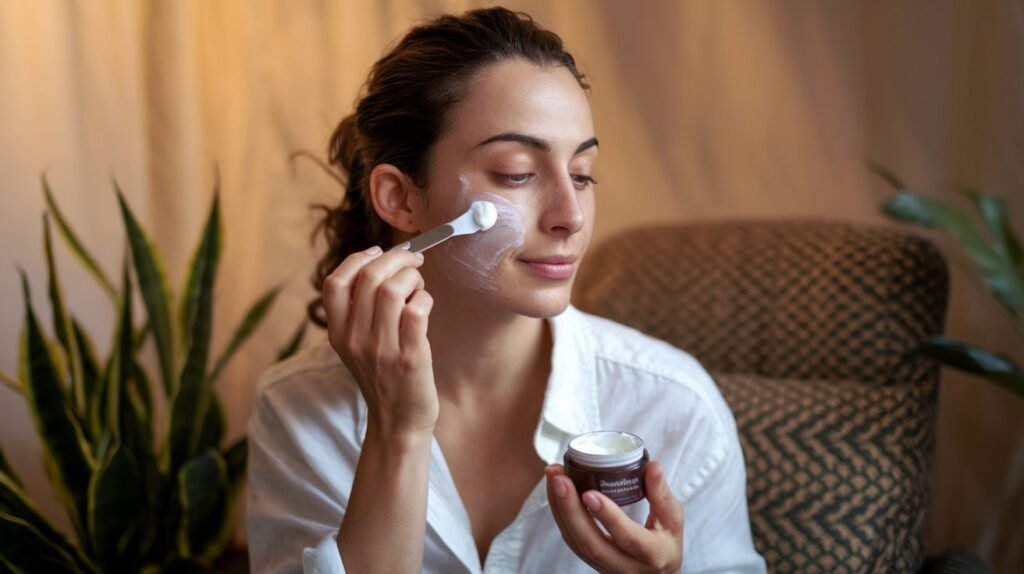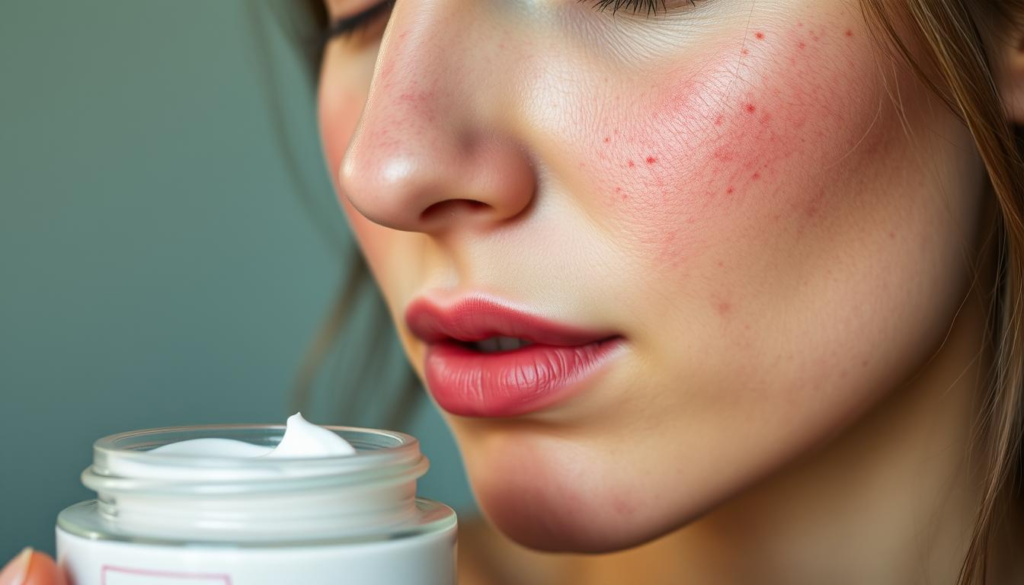I’ve always been obsessed with skincare, constantly on the lookout for the next big thing that promises youthful, glowing skin. When I first heard about collagen creams, it felt like a godsend. Collagen, a protein that provides our skin structure and firmness, starts to breakdown as we age, resulting in wrinkles and sagging skin. The promise of restoring that lost collagen with a topical cream seemed too good to pass up.
But like many things in skincare, not everything is as perfect as it sounds. So, what are the side effects of collagen cream on the face?
In this article, I’ll Walk you through my personal experience, the science behind collagen creams, and what you should watch out for before you start incorporating one into your routine.
You can check this also: Does Collagen Cream Help Wrinkles? Find Out Here.
What is Collagen Cream and How Does it Work?
Collagen is key to our skin’s health, making it look young and plump. We begin to produce less collagen in our bodies in our 20s. This loss gets worse with age, sun, smoking, or sugar.
Collagen creams try to introduce this protein to our skin. They help keep it hydrated, reduce wrinkles, and rejuvenate it.
Understanding Collagen’s Role in Skin Health
Collagen is vital for skin health and elasticity. It gives our skin structure, flexibility, and youthful bounce. As we age, our collagen levels drop, causing wrinkles and sagging.
Collagen in skincare creams mainly moisturizes the skin. It doesn’t really boost collagen production. As a result, hydration and plumping take precedence over long-term collagen growth.
My First Experience with Collagen Cream
When I first applied collagen cream, I was full of excitement. The texture was smooth, the scent was pleasant, and it left my skin feeling soft and hydrated. I immediately noticed that my skin looked plumper after application, which I loved. However, after a few days, I started to notice a few unexpected side effects that had me reconsidering my enthusiasm.

Side Effects of Collagen Cream on the Face
Collagen creams are popular for their skin benefits. But, it’s important to know about their side effects, especially on the face. These products can be good, but they might not work for everyone. Knowing the possible side effects helps you use them safely.
Here are some of the side effects I, and many others, have experienced:
Breakouts and Pimples
One of the most annoying side effects I encountered was breakouts. I have combination skin that’s oily in some spots and dry in others, and after just a week of using collagen cream, I noticed tiny whiteheads popping up on my cheeks and forehead.
This happened because the cream was a bit too rich for my skin type, clogging my pores and leading to acne. If you have oily or acne-prone skin like me, be careful with thicker collagen creams. They’re often packed with hydrating ingredients that, while great for some, can suffocate oily skin and lead to breakouts.
This experience was so frustrating because, at first, the cream felt wonderful on my skin. It was smooth, and hydrating, and left my skin feeling soft. But after a few days, I started noticing clogged pores and bumps that I hadn’t seen before. It’s a classic case of a product being too heavy for my particular skin type, and it taught me to really pay attention to the formula, especially if you’re prone to acne like I am.
Allergic Reactions
Thankfully, I didn’t experience a severe allergic reaction myself, but I’ve spoken to others who have. Redness, itching, and irritation can all be signs that you’re having an allergic reaction to the ingredients in your collagen cream. The source of collagen (whether it’s marine-based from fish, or animal-based like bovine) could be one of the culprits. Some people are sensitive to these animal-derived ingredients, while others react to preservatives or fragrances that are often added to skincare products.
I’ve learned to always patch test products before putting them on my face. I know it’s tempting to dive right in, especially when you’re excited about a new product, but applying a small amount to your wrist or behind your ear will be much easier for you if you wait a whole day. Trust me, it’s worth the wait to avoid a full-face reaction.
Dryness or Flakiness
This one really surprised me. I assumed collagen cream would make my skin super hydrated and plump, but after about two weeks of regular use, I started to notice dryness around my nose and mouth, areas where I never usually have issues. Some collagen creams contain powerful anti-aging ingredients like retinoids, which can speed up cell turnover and cause dryness or flakiness if you’re not careful.
In my case, I realized that while the cream was hydrating at first, over time, it seemed to be stripping my skin or just not providing enough moisture. This was especially noticeable when the weather turned colder, and my skin needed that extra hydration. If you have dry or combination skin, it’s so important to pair your collagen cream with a heavier moisturizer or at least ensure the product isn’t irritating areas that are already sensitive.
Irritation or Sensitivity to Sunlight
One thing I didn’t initially think about was how some of the ingredients in my collagen cream would interact with sunlight. Many collagen treatments, particularly those containing retinol or vitamin C, might increase your skin’s sensitivity to sunlight. After applying the cream in the morning and heading outside without any sunscreen (yes, I know, bad move!), I noticed my skin was getting redder and more irritated than usual.
In hindsight, I should have known better. If your collagen cream has retinoids or vitamin C, you need to wear a high-SPF sunscreen every day—and I mean every single day. These ingredients can be amazing for anti-aging, but they also make your skin much more vulnerable to UV damage. I learned this the hard way, but now I never skip my SPF, even if I’m just popping outside for a quick errand.
Other Potential Side Effects
While the above are the most common side effects I’ve personally noticed and heard from others, here are a few more that you might want to be aware of:
- Excessive Oiliness: While some people (like me) experience breakouts, others might notice that their skin becomes overly greasy after using collagen cream. This happens because the cream could be too occlusive, trapping oils and making your skin feel slick.
- Milia Formation: Milia are tiny white bumps that form when keratin becomes trapped beneath the skin’s surface. Some collagen creams, especially those that are heavier in texture, can lead to the development of milia, particularly around the delicate eye area. If you’re prone to milia, choose a lighter formula or apply the cream sparingly.
- No Noticeable Results: For some, the downside might not be an adverse reaction but simply a lack of results. Despite the promises of reduced wrinkles and firmer skin, collagen molecules are often too large to penetrate the skin’s surface. In such cases, collagen creams may end up just functioning as a regular moisturizer, rather than delivering the significant anti-aging effects you were hoping for.

How to Avoid Side Effects of Collagen Cream
So, how do you enjoy the benefits of collagen cream without the unwanted side effects? Here are my tips:
- Choose the Right Formula: Not all collagen creams are created equal. If you have oily or acne-prone skin, opt for a non-comedogenic formula that won’t clog your pores. If you’re prone to dryness, look for a collagen cream that contains added moisturizers like hyaluronic acid or glycerin.
- Use Sparingly at First: When starting any new skincare product, it’s best to introduce it slowly into your routine. Use your collagen cream every other day at first, then gradually increase to daily use if your skin seems to tolerate it well.
- Patch Test Before Use: Before using a new product on your whole face, always try a patch test first. Apply a small amount of the cream to an area of skin (like your wrist) and wait 24-48 hours to check for any allergic reactions or irritation.
- Balance Your Routine: Collagen cream can be a great addition to your routine, but it shouldn’t replace your other skincare essentials. Make sure to continue using a gentle cleanser, toner, and moisturizer, especially if your collagen cream contains strong anti-aging ingredients like retinol or vitamin C.
- Apply Sunscreen: As I mentioned earlier, if your collagen cream contains ingredients like retinoids or vitamin C, it’s vital to apply sunscreen during the day. This helps prevent irritation and protects your skin from sun damage while you’re using these powerful treatments.
Alternatives to Collagen Creams
If you’re looking to avoid collagen cream side effects or prefer natural options, there are great alternatives. These natural remedies and ingredients can help your skin look young and healthy. They offer a gentler way to achieve radiant skin.
Natural Remedies for Skin Rejuvenation
More people are choosing natural alternatives over collagen creams. These options include plant-based collagen and antioxidant-rich oils. They nourish your skin from the inside out, without the risk of side effects.
- Retinol, a Vitamin A derivative, treats acne, uneven skin, and fine lines. It promotes cell regeneration and collagen formation.
- Hyaluronic acid keeps skin moist and reduces wrinkles. It is effective both topically and orally.
- Aloe vera increases collagen production. It’s good for wounds, burns, and overall skin health when taken orally or applied.
- Vitamin C is key for collagen production. A shortage of it can cause scurvy. Eating foods rich in vitamin C or using serums can help.
- Ginseng boosts collagen levels in the blood. It’s good for skin health and elasticity.
These natural solutions are a gentle yet effective method to renew your skin. They address many skin concerns without causing irritation or adverse reactions.
Summary
For me, the results of collagen cream have been a bit of a mixed bag. While it certainly offers hydration and can make your skin feel temporarily plumper, the side effects of collagen cream on the face—like breakouts, dryness, and irritation—are real, and it’s important to approach it with caution. If you do decide to try it, make sure you pick the right formula for your skin type, start slowly, and always, always wear sunscreen.
At the end of the day, it might work wonders for some people, but for me, it’s just another product that comes with its pros and cons. If you’re like me and have struggled with skin reactions in the past, you may want to proceed carefully—or explore other anti-aging options that work with your skin, not against it.
Frequently Asked Questions
Q: Can collagen cream cause acne or clogged pores?
A: Yes, some collagen creams can cause acne or clogged pores, particularly if they are thick or heavy. People with oily or acne-prone skin are more susceptible to this issue.
Q: Is collagen cream safe for sensitive skin?
A: It can be, but people with sensitive skin should be cautious. Always do a patch test before using the cream on your face to check for any adverse reactions like irritation or redness.
Q: How can I reduce the risk of side effects from collagen cream?
A: To reduce the risk, always patch test first, use the cream in moderation, choose a formula suited to your skin type, and don’t forget to wear sunscreen if the product contains retinol or vitamin C.
Q: Can collagen cream make my skin more sensitive to the sun?
A: Yes, if the collagen cream contains ingredients like retinol or vitamin C, it can make your skin more sensitive to sunlight, leading to redness or sunburn. It is important that you use sunscreen during the day.
Q: How can I prevent breakouts when using collagen cream?
A: To prevent breakouts, choose a non-comedogenic collagen cream, apply sparingly, and ensure you’re using a gentle cleanser and exfoliator to keep your pores clear.
Resources

